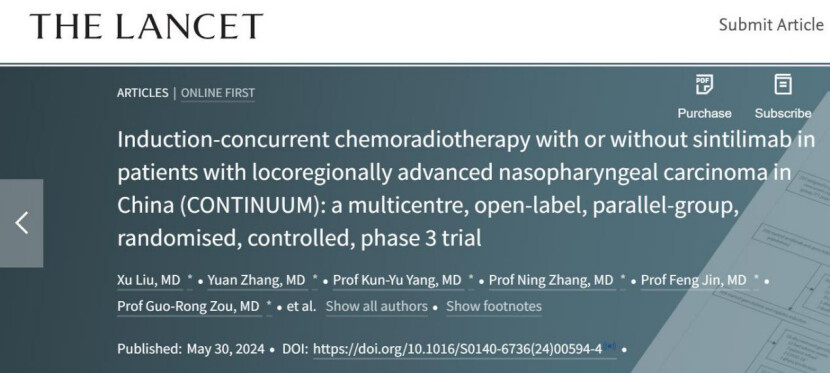A recent collaborative study led by Professor Ma Jun from Sun Yat-sen University Cancer Center (SYSUCC) has made a significant breakthrough in the treatment of nasopharyngeal cancer (NPC). This study, published online on May 30 in the prestigious medical journal The Lancet, reveals that the addition of sintilimab, a PD-1 antibody, to standard chemoradiotherapy significantly improves survival rates among patients with high-risk, locally advanced NPC.

Screenshot from The Lancet.
NPC is highly prevalent in China, with 75% of newly diagnosed cases presenting as locally advanced at the outset. The current standard treatment, recommended by guidelines from the United States, China, and Europe, is to add chemotherapy before and during radiotherapy. However, despite receiving this standard therapy, approximately 20% of patients experience recurrence or metastasis, which underscores the urgent need for novel treatment approaches.
Immunotherapy, represented by PD-1 or PD-L1 antibodies, works by activating the patient's own immune cells to attack tumors. While previous domestic and international studies have demonstrated the effectiveness of immunotherapy in recurrent or metastatic NPC, its efficacy in newly diagnosed, locally advanced NPC patients without metastasis at the time of diagnosis remained uncertain.
To deal with it, Professor Ma Jun, an academician of the Chinese Academy of Sciences and executive deputy director of SYSUCC, led a clinical trial investigating the combination of PD-1 antibody sintilimab with chemoradiotherapy for the treatment of high-risk, locally advanced NPC.
Between Dec 21, 2018, and March 31, 2020, 425 patients were enrolled and randomly assigned to the sintilimab or standard therapy groups. Following a median follow-up of 42 months, patients in the sintilimab group experienced a remarkable improvement in the three-year event-free survival rate, increasing from 76% to 86%. Moreover, the risk of recurrence was reduced by 46%, and the risk of distant metastasis was reduced by 43%. Importantly, the addition of sintilimab did not significantly impact patients' quality of life.
Professor Nabil F. Saba, director of the Head and Neck Cancer Medical Oncology Program at Winship Cancer Institute of Emory University and elected Chair of the National Cancer Institute's task force for recurrent metastatic head and neck cancer, comments that "it is the first such observation in an immunotherapy-based trial of patients with mucosal head and neck cancers, including locally advanced nasopharyngeal carcinoma. Although a sequential approach in the immunotherapy era is by no means a guaranteed path to success, CONTINUUM could be pointing clinical researchers in the right direction."
Professor Ma noted that this new treatment strategy has been incorporated into the latest guidelines of the Chinese Society of Clinical Oncology for the diagnosis and treatment of NPC and is expected to be adopted by international guidelines, heralding a new era of immunotherapy for locally advanced NPC.
The study was led by the SYSUCC in collaboration with eight other institutions, including the Union Hospital of Tongji Medical College of Huazhong University of Science and Technology, the First People's Hospital of Foshan, Guizhou Cancer Hospital, Guangzhou Panyu Central Hospital, the Affiliated Tumor Hospital of Guangxi Medical University, West China Hospital of Sichuan University, Xijing Hospital, and Xiangya Hospital of Central South University.
Author | Hannah
Editor | Olivia, Nan, Abby, James
















